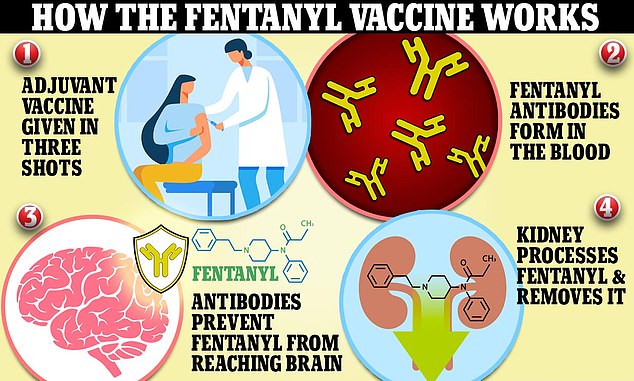A new vaccine that can completely block the effects of fentanyl is set to enter human clinical trials.
The injection, which has shown promise in animal studies, primes the immune system to recognize and attack the highly addictive opioid before it reaches the brain.
This prevents the drug from binding to the receptors responsible for pain relief and euphoria. It would also prevent an overdose, which occurs when the drug binds to the receptors and interferes with breathing.
The University of Houston researchers who developed the vaccine aim to begin human trials in April 2025.
They hope the breakthrough treatment could help curb the fentanyl epidemic that kills more than 103,000 Americans each year.
Researchers developed a three-dose vaccine that causes antibodies to form against fentanyl in a person’s bloodstream. These antibodies can block the drug from reaching the brain and completely negate it. This, in turn, stops overdoses.

A sad scene lingers on Kensington Ave in Philadelphia on Christmas Day last year. Fentanyl has run rampant in the U.S. drug supply, leading to a surge in drug overdose deaths
If successful, the vaccine will move into further trials, but researchers say it could still be five to 10 years before it reaches hospitals.
An estimated 103,451 people die from drug overdoses each year in the United States, estimates suggest, and 70 percent of these deaths are thought to be caused by fentanyl.
The drug is deadly in small doses (as little as three milligrams) and is 50 times stronger than heroin and 100 times stronger than morphine.
Dr. Colin Haile, a research associate professor at the University of Houston who is leading the vaccine development, said the team was working quickly to test the vaccine and get it to hospitals.
“We need to get something to market as soon as possible to address this terrible problem,” he said. “The ultimate goal is to protect people and save lives.”
Doctors are already using naloxone (brand name Narcan) to treat overdose patients, but the drug must be administered quickly to save patients.
The researchers suggest the new vaccine would be offered to drug addicts and would hopefully provide protection for a significant period of time (trials in rats show it triggers protection for at least ten weeks).
Experts have struggled to create a vaccine against fentanyl since the 1970s because, unlike bacteria or viruses, our immune systems do not easily recognize opioids as invaders.
But they have found a potential approach: attaching part of the drug to a harmless part of a bacteria that triggers an immune response.
For their vaccine, researchers have linked some of the fentanyl to an enterotoxin, or a chemical produced by the E. coli bacteria, which has already been tested in 15 human trials and has caused virtually no side effects.
Its efficacy has already been demonstrated in trials on rats (revealed in November 2022), where it triggered anti-fentanyl antibodies.

The chart above shows the number of Americans who die from drug overdoses each week. Nearly 2,000 people continue to die from medical emergencies each week.

The map above shows the change in drug overdose deaths by year. Although numbers are declining in many states, they are still much higher than they were just five years ago.
In the Phase I trial, the vaccine will be given to a small number of healthy people who are also addicted to opioids.
This is to check if it is safe to use on humans, check for side effects, and establish an optimal dosage.
It is not clear how many doses participants may receive, but in the rat studies, rodents received three doses administered once every three weeks. The cost of each dose is not yet clear.
Researchers say the trials will likely take place in Australia or the Netherlands, although they are also considering options in the United States.
But they expect challenges during the research because the population to be tested (drug users) may be difficult to track.
Dr. Jay Evans, director of the University of Montana’s Center for Translational Medicine, who is also involved in the research, said: ‘Compared to a normal infectious disease clinical trial, it will be more difficult.
‘The FDA is pretty adamant that they are not going to test this vaccine on healthy individuals who do not have some type of opioid addiction.
‘So we need to target patients in Phase I who have a history of opioid use disorder, and that’s a more difficult population to recruit.
‘It’s going to take longer; the patient population will have more adverse events because they are drug users and it will be harder to track them.’
Researchers say the vaccine will prevent fentanyl side effects, but will do nothing to prevent cravings, withdrawal symptoms or motivate someone to seek clinical care.
However, those who use drugs will likely still experience an effect, they said, but it will be less intense because the action of fentanyl is eliminated.
It is also not thought to interfere with the action of other medications such as morphine, meaning those suffering from medical emergencies can still receive treatment.
The vaccine was purchased by startup Ovax in November 2023 and the company has already raised $10 million to fund further research.
Results from the animal studies showed a significant increase in antibody levels against the drug between weeks four and six, and then continued protection from the fourth to the tenth and final week of the study.
Data shows that fentanyl is toxic even in tiny amounts: Overdoses can cause a person to stop breathing and deprive the brain of oxygen, which can lead to death or permanent disability.


